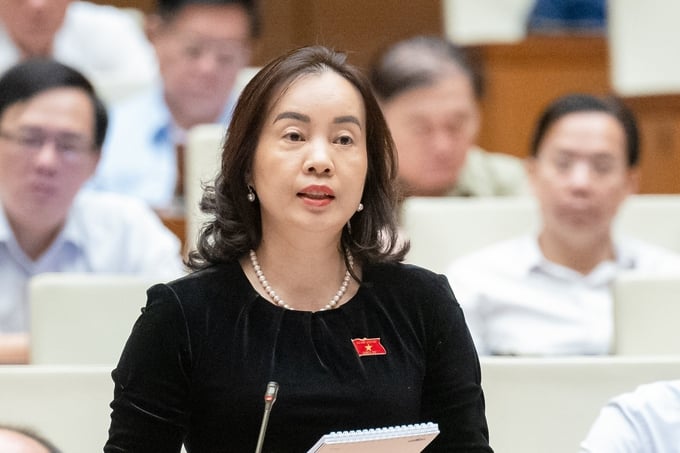November 25, 2025 | 10:00 GMT +7
November 25, 2025 | 10:00 GMT +7
Hotline: 0913.378.918
November 25, 2025 | 10:00 GMT +7
Hotline: 0913.378.918

Delegate Nguyen Thi Kim Anh (Bac Ninh). Photo: National Assembly.
During the recent inquiry session at the National Assembly, delegate Nguyen Thi Kim Anh from Bac Ninh emphasized that Vietnam is primarily an agricultural nation and is among the top three largest exporters of rice globally.
Due to export limitations imposed by certain countries, the impact of El Nino on global climate, reduced cultivation areas, intense competition among domestic rice firms, and rising rice prices, farmers are experiencing decreased benefits.
The Decree No.107, which was issued by the Government in 2018 to regulate rice exportation and trading, showed certain deficiencies that do not align with practical circumstances.
Hence, the delegate has urged the Ministry of Industry and Trade to provide a clear outline of the suggested content for revision to the Government, along with a timeline for the issuance of the Decree to address obstacles and improve the value of Vietnamese rice products.
In response to delegate Nguyen Thi Kim Anh's query, Minister of Industry and Trade Nguyen Hong Dien affirmed that Decree 107, which governs rice export operations, has exhibited several deficiencies since its enactment. As a result, the Government has instructed the Ministry of Industry and Trade to make revisions to it. Presently, the Ministry is in the midst of completing the final version of the proposed modification to Decree 107.
The spirit of the modifications to Decree 107 revolves around four essential aspects:
Firstly, there is a need to revise and enhance the legislation regarding the reporting and statistical procedures, export agreements, and the enforcement of export agreements in a more stringent manner. This should include imposing severe fines to discourage traders from delaying or neglecting their reporting obligations.
Secondly, it is necessary to revise and enhance regulations in order to precisely delineate the post-audit timeframe for the Departments of Industry and Trade subsequent to the issuance of the rice export certificate. This regulation thus enhances the accountability of local administrations.
Thirdly, it is necessary to revise and enhance the specific coordination structures and procedures between the Ministry, sectors, localities, and relevant agencies in order to effectively manage rice exports and ensure adherence to principles and efficacy in policy execution.
Furthermore, to enhance efforts in expanding the market and promoting trade for Vietnamese rice. Therefore, a specialized program focused on enhancing trade activities and promoting the trade of rice and rice products would be implemented.
Additionally, in order to enhance the existing restrictions on export authorization and rice export entrustment, it is required that traders who provide and receive authorization possess certification and the legal authority to engage in rice export activities.
According to preliminary statistics from the General Department of Customs, in April 2024, Vietnam's rice exports decreased by 10.9% in volume, decreased by 12.6% in turnover compared to March 2024 and prices decreased by 2% to over 1 million tons, equivalent to 619.89 million USD, average price 618.6 USD per ton.
The Ministry of Agriculture and Rural Development (MARD) forecasts that the weather is not favorable and the supply is not abundant while many countries tend to increase imports for reserve purposes. In addition, some countries continue to ban and restrict exports along with many hot spots of conflict in the world continuing, causing the world rice market to continue to be vibrant in the near future.
Vietnam has exceeded Thailand in terms of rice shipments to the Philippines
The Vietnam Trade Office in the Philippines, which is under the Ministry of Industry and Trade, has released data from the Plant Industry Bureau of the Philippine Department of Agriculture. According to this data, rice imports to the Philippines in the first five months of 2024 amounted to nearly 2 million tons, showing a substantial growth compared to the corresponding period in the previous year.
Since the start of the year, the Plant Industry Bureau has granted 4,066 import clearance permits for rice to importing firms. The Philippines' primary rice export partner is Vietnam.
Between January 1 and May 23, the quantity of rice exported from Vietnam to the Philippines amounted to 1.44 million tons, representing 72.9% of the total rice imports of the Philippines. After Vietnam, the countries that follow include Thailand, Pakistan, Myanmar, and several others.
The projected rice import volume for the Philippines in 2024 is at 4 million tons. Some firms have observed that the Philippine market shows a preference for Vietnam's DT8 and 5451 rice varieties because of their tender feel after cooking.
Presently, Vietnamese rice holds a dominant position in the Metro Manila region and the southern provinces, owing to its delectable flavor and affordable cost.
Translated by Linh Linh

(VAN) The Ministry of Agriculture and Environment must spearhead the construction of green governance, spanning decision-making processes and investment standards to policy evaluation mechanisms.

(VAN) The Agriculture and Environment sector of Khanh Hoa has achieved numerous milestones over the past 80 years, contributing significantly to the goal of establishing the province as a centrally governed city by 2030.

(VAN) Viet Nam is entering the pivotal period of 2025-2030, moving toward the formulation of the Remote Sensing Law, which will establish a legal foundation for the development of national digital data.

(VAN) The agricultural sector is finalizing the strategic framework for emission reduction, setting the goal of sharply cutting methane and 403.7 million tons of CO2 equivalent and moving toward Net Zero by 2050.
/2025/11/22/2236-1-153832_483.jpg)
(VAN) The National Marine Spatial Planning is opening up opportunities for sustainable blue sea development across 21 coastal localities.

(VAN) Viet Nam’s forestry sector is undergoing a comprehensive transformation, strengthening management, protection, and development efforts to maintain ecological security and drive green, sustainable growth.

(VAN) Viet Nam is accelerating efforts to digitize reservoir operations, from real-time data to hydraulic modelling.